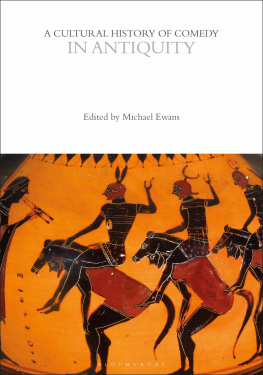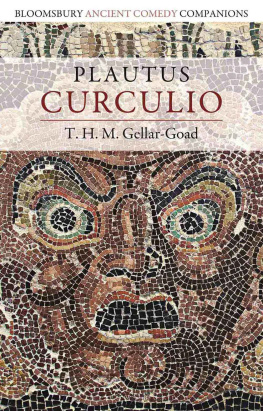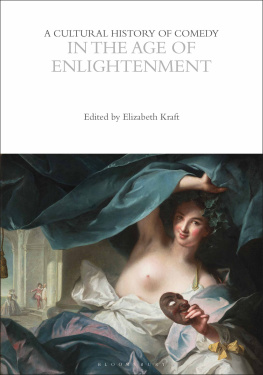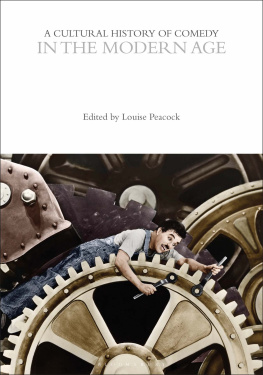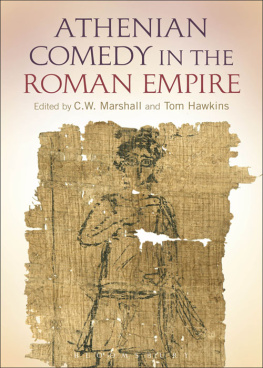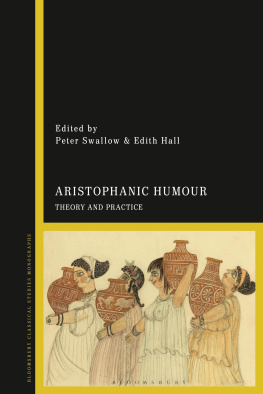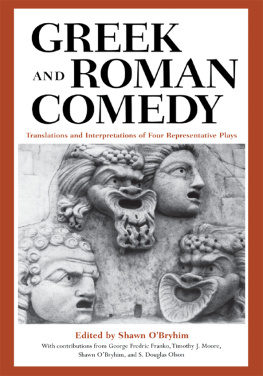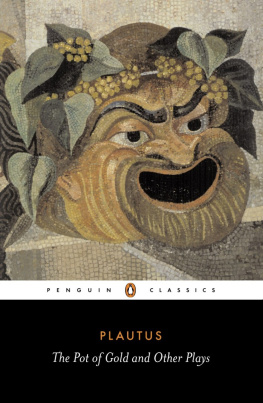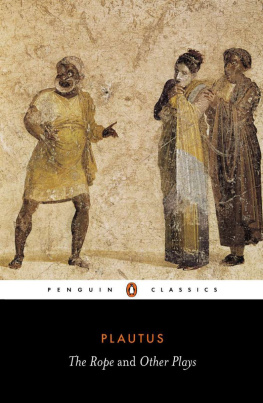
A CULTURAL HISTORY
OF COMEDY
VOLUME 1
A Cultural History of Comedy
General Editors: Andrew McConnell Stott and Eric Weitz
Volume 1
A Cultural History of Comedy in Antiquity
Edited by Michael Ewans
Volume 2
A Cultural History of Comedy in the Middle Ages
Edited by Martha Bayless
Volume 3
A Cultural History of Comedy in the Early Modern Age
Edited by Andrew McConnell Stott
Volume 4
A Cultural History of Comedy in the Age of Enlightenment
Edited by Elizabeth Kraft
Volume 5
A Cultural History of Comedy in the Age of Empire
Edited by Matthew Kaiser
Volume 6
A Cultural History of Comedy in the Modern Age
Edited by Louise Peacock

CONTENTS
INTRODUCTION
CHAPTER ONE
CHAPTER THREE
CHAPTER FIVE
Valeria Cinaglia is Honorary Research Fellow at the Department of Classics and Ancient History of Exeter University. She has been Teaching Assistant in Exeter, Kings College London and UCL. She is the author of Aristotle and Menander on the Ethics of Understanding (2014) and various papers on comedy, Menander, Aristotle, and the reception of Greek and Roman comedy.
Caleb M. X. Dance is an Assistant Professor of Classics at Washington and Lee University in Lexington, Virginia. His teaching and research interests include laughter, genre, and narrative in Greek and Latin literature. He is currently preparing a monograph on laughters literary-critical function in the poetry of Augustan Rome, specifically Vergils Eclogues, Horaces Satires and Epistles, and Ovids Amores and Ars Amatoria.
Michael Ewans is Conjoint Professor in the School of Humanities and Social Science at the University of Newcastle, Australia. Before retiring from the Chair of Drama in 2011 he specialized in directing plays and chamber operas, translating Greek tragedy and comedy, and writing books and articles which explore how operas and dramas work in the theater. His eleven books include a complete set of accurate and actable translations of Aeschylus and Sophocles in four volumes, with theatrical commentaries, followed by two volumes of comedies by Aristophanes, also in his own new translations with theatrical commentaries. His most recent book is Performing Opera: A Practical Guide for Singers and Directors (Methuen Drama, 2016). Michael Ewans was elected in 2005 to a Fellowship of the Australian Academy of the Humanities.
Marcel Lysgaard Lech is Associate Professor of Classical Studies at the University of Southern Denmark. His publications range from works on Greek tragedy and Greek comedy to Greek epigraphy, and he has translated works of Plato, of all the tragedians and Aristophanes. Currently, his research focuses on body parts as imagery in Sophocles tragedies.
Gesine Manuwald is Professor of Latin at University College London. She has published extensively on Roman drama, Roman epic, Ciceros speeches, and Neo-Latin literature. Her publications in the area of drama include the following books: Fabulae praetextae (2001), Pacuvius (2003), Roman Drama: A Reader (2010), Roman Republican Theatre (2011), Tragicorum Romanorum Fragmenta (TrRF), Vol. II (2012), Rmisches Theater (2016), and Fragmentary Republican Latin, Vols. III (2018).
Louise Peacock is an associate professor in drama at De Montfort University, England. She teaches in the areas of commedia dell arte, clowning and stage comedy. She is the author of two books, Serious Play: Modern Clown Performance (2009) and Slapstick and Comic Performance (2014). She also co-edited Popular Performance (Methuen Drama, 2017). She has written numerous peer-reviewed articles and chapters on Commedia dell Arte, Stand-up Comedy and Clowning. She is the editor of A Cultural History of Comedy in the Modern Age (Bloomsbury Academic, 2020).
Isabel Ruffell is Professor of Greek Drama and Culture at the University of Glasgow, and has published on Greek and Roman drama, Roman satire and ancient mechanics, including the books Politics and Anti-Realism in Athenian Old Comedy: The Art of the Impossible (2011) and Aeschylus: Prometheus Bound (Bloomsbury Academic, 2012).
Natalia Tsoumpra (BA Aristotle University of Thessaloniki, MPhil and DPhil University of Oxford) is a lecturer in Classics at Glasgow University. She specializes in Greek comedy and tragedy, while she is also broadly interested in ancient medicine, magic, gender and sexuality, and theories of humor. She has published journal articles, chapters in edited books, and reviews on Greek drama, and has recently co-edited a volume on morbid laughter (2018), which appears as a special issue in Illinois Classical Studies (43.2). She is currently preparing for publication her dissertation on comic leadership and power dynamics in Aristophanes, and working on her new project, Pride, Shame, and Illness: Power Dynamics in the Ancient Medical Encounter. She has an ongoing interest in performance and theater practice, and has worked closely with the Glasgow University Classics society for the production of several classically themed plays.
Serena S. Witzke earned her PhD in Classics from the University of North Carolina-Chapel Hill with a dissertation entitled Reading Ancient Greek and Roman New Comedy through Oscar Wildes Society Plays. She specializes in New Comedy, ancient gender and sexuality, and Classical Reception. Her latest project examines pronatalism, authoritarianism, and reproductive rights from Augustus to Trump. She teaches at Wesleyan University.
One of the best places to look for the deep-lying thoughts, feelings and presumptions of a society is in its comedy. Any historical text rewards informed study for the insights into sociocultural contexts that reside sometimes invisibly in and between its lines. Texts associated with comedy and the comic go that step deeper by virtue of being built upon a generic presumption of insider status.
Umberto Eco, the writer, philosopher, and semiotician, intimated as much in a 1980 essay when he pointed out that, unlike tragedy, comedy assumes a nigh conspiratorial stance toward the society it renders. According to Eco, the tragic journeys of, say, Orestes and Madame Bovary may derive from societies differing to some extent from our own, but the codified injunctions regarding retribution and adultery are made eminently clear as part and parcel of their textual worlds. In comic texts, on the other hand, we encounter the fact that comedy does not always travel well, and without a degree in classics we dont know exactly why the Socrates of Aristophanes should make us laugh (1995: 270). Eco concludes that, whereas tragedy will acknowledge the social rule being violated and, indeed, examine its validity, comic works take the rule for granted, and dont bother to restate it (1995: 272). Building upon this principle, comedy trades on that within society which needs no introductionit takes as given the rules and structures it breaks, varies, and usually reaffirms. A probing of the comic practices of other times and places, with a critical light shone on their assumptions by the many contributors assembled in these volumes, stands to expose considerable tensions between individuals and society. A cultural history of comedy, then, promises wide-ranging insight through the examination of both how it presents experience on the ground, and what further it reveals about what goes without saying in the everyday life beneath it.
Next page
